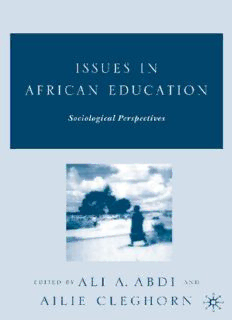
Issues in African Education: Sociological Perspectives PDF
Preview Issues in African Education: Sociological Perspectives
ssues in frican ducation I A E This page intentionally left blank ssues in frican ducation I A E SOCIOLOGICAL PERSPECTIVES Edited by Ali A. Abdi and Ailie Cleghorn ISSUESINAFRICANEDUCATION © Ali A.Abdi and Ailie Cleghorn,2005. All rights reserved.No part of this book may be used or reproduced in any manner whatsoever without written permission except in the case of brief quotations embodied in critical articles or reviews. First published in 2005 by PALGRAVE MACMILLAN™ 175 Fifth Avenue,New York,N.Y.10010 and Houndmills,Basingstoke,Hampshire,England RG21 6XS Companies and representatives throughout the world. PALGRAVE MACMILLAN is the global academic imprint of the Palgrave Macmillan division of St.Martin’s Press,LLC and of Palgrave Macmillan Ltd. Macmillan® is a registered trademark in the United States,United Kingdom and other countries.Palgrave is a registered trademark in the European Union and other countries. ISBN 1–4039–7069–6 A catalogue record for this book is available from the British Library. Library of Congress Cataloging-in-Publication Data Issues in African education :sociological perspectives / edited by Ali A. Abdi,Ailie Cleghorn. p.cm. Includes bibliographical references and index. ISBN 1–4039–7069–6 1.Education—Social aspects—Africa.I.Abdi,Ali A.,1955– II.Cleghorn, Ailie,1940– LC191.8.A4I77 2005 306.43(cid:2)096—dc22 2005046428 Design by Newgen Imaging Systems (P) Ltd.,Chennai,India. First edition:November 2005 10 9 8 7 6 5 4 3 2 1 Printed in the United States of America. ontents C List of Tables and Figures vii List of Contributors ix Preface xiii Acknowledgments xv Part I Theoretical Foundations 1. Sociology of Education: Theoretical and Conceptual Perspectives 3 Ali A. Abdi and Ailie Cleghorn 2. African Philosophies of Education: Counter-Colonial Criticisms 25 Ali A. Abdi 3. National “Development” and African Universities: A Theoretical and Sociopolitical Analysis 43 Korbla P. Puplampu Part II Culture,Language,and the Curriculum 4. Reclaiming Our Memories: The Education Dilemma in Postcolonial African School Curricula 65 Edward Shizha 5. Surveying Indigenous Knowledge, the Curriculum, and Development in Africa: A Critical African Viewpoint 85 Nkosinathi Mkosi 6. Language Issues in African School Settings: Problems and Prospects in Attaining Education For All 101 Ailie Cleghorn 7. Cultural Perspectives on Science and Technology Education 123 Meshach B.Ogunniyi vi Contents Part III Gender and Equity Issues in Education 8. Women’s Education and Social Development in Africa 141 Benedicta Egbo 9. Achieving Gender Equity in Africa’s Institutions of Tertiary Education: Beyond Access and Representation 159 Philomina Okeke-Ihejirika 10. Gender and Education in Sub-Saharan Africa: The Women in Development (WID) Approach and its Alternatives 175 Codou Diaw 11. Quandaries, Prospects, and Challenges of Nomadic Educational Policy for Girls in Sub-Saharan–Africa 193 Lantana Usman 12. Narratives from Ghana: Exploring Issues of Difference and Diversity in Education 219 George J. Sefa Dei and Alireza Asgharzadeh Part IV Education and Change 13. Democratizing Education in Zambia: Sociohistorical Analyses 241 Edward Shizha and Ali A. Abdi 14. At the Mercy of Informal Learning: Education and Development in Stateless Somalia 259 Ali A. Abdi 15. Social Organization of Teacher Education in Africa: A Kenyan Case Study 275 Njoki Wane 16. The Role of the School in Africa in the Twenty-First Century: Coping with Forces of Change 297 Okwach Abagi Index 317 ist of ables and igures L T F Tables 8.1 Gross enrollment ratio (%) at the primary, secondary, and tertiary levels of education in selected countries in Africa 142 9.1 Tertiary gross enrollment ratios (%) in selected African countries, 1998–2001 165 9.2 Female academic staff in Africa’s tertiary institutions, 2000–2002 167 11.1 Nomadic Fulani girls’ economic mainstay 195 11.2 Enrollment of nomadic primary school students by gender, 1990–1999 200 11.3 Existing types of nomadic classroom structures 201 11.4 Effect of herding on children’s schooling 201 11.5 Time children attend school 202 13.1 Admission to grade 1, 1990–1996 249 15.1 Number of primary teachers by qualification and sex for the selected years, 1997–1999 284 16.1 HIV/AIDS statistics and features by region, December 1999 302 Figures 6.1 “Whose culture, whose literacy?” 116 9.1 Rates of female enrollment in tertiary education, 1980–1996 164 This page intentionally left blank ist of ontributors L C Okwach Abagi obtained his PhD from McGill University, his B.Ed. and M.A. from the University of Nairobi. He is the Director of OWN and Associates Center for Research and Development in Nairobi which has offered technical assistance in Eastern and Southern African regions for various organizations including UNIFEM, UNESCO, UNICEF, UNDP, CARE—Kenya, Action AID, CARE—Sudan/Somalia, Inter- University Council of East Africa (IUCEA) and the Commonwealth Secretariat. Ali A. Abdi is Associate Professor in the Department of Educational Policy Studies at the University of Alberta, Canada. He received his PhD from McGill University. His teaching areas include comparative and international education, sociology of education, and cultural stud- ies in education. He is currently conducting a major research project on citizenship education and social development in sub-Saharan Africa with a focus on Zambia. His articles have appeared in such journals as Comparative Education, Journal of Postcolonial Education, International Education Journal, Horn of Africa Journal, and Western Journal of Black Studies. He is also the author of Culture, Education and Development in South Africa, and coauthor (with Ratna Ghosh) of Education and the Politics of Difference. Alireza Asgharzadeh is a PhD candidate in the Department of Sociology and Equity Studies, Ontario Institute for Studies in Education of the University of Toronto. His areas of concentration and research include: sociolinguistics, social inequality, and sociology of education. Ailie Cleghornis Associate Professor in the Department of Education at Concordia University in Montreal. Her PhD from McGill University is in the Comparative Sociology of Education. Her qualitative studies in East and southern African primary schools have focused on language issues in the teaching of science and mathematics. Lately her research has included teachers’ conceptions of early childhood in societies undergoing social change. Her articles appear in such journals as the
Description: